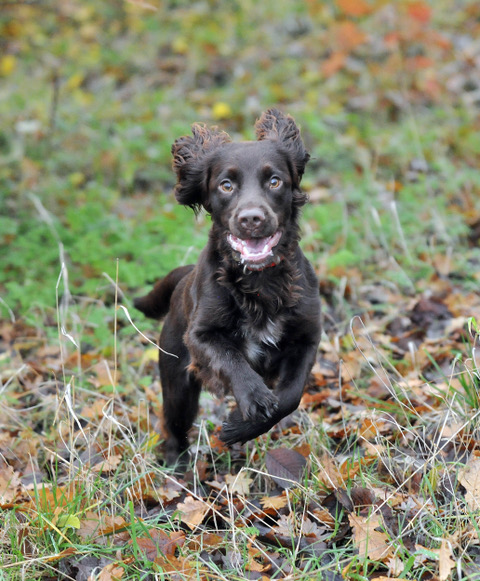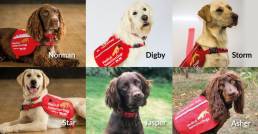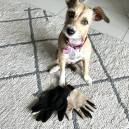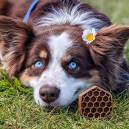Six Super Sniffers That Could Detect COVID-19
April 29, 2020 • Health & Wellness • Most Popular •
Image Credit: Bex Arts/ Nigel Harper Photography
With COVID-19 testing and treatment still being limited, researchers are looking into ways that medical detection dogs can help. Today, scientists believe that these super sniffer dogs can be trained to sniff out coronavirus in people. Some of these dogs are already pre-trained detector dogs that could be trained in no time at all.
Medical or bio detection dogs play a huge role in detecting health conditions. These dogs are trained to find the odor of diseases, such as cancer, in samples such as urine and swabs. Medical Alert Assistance Dogs are trained to detect minute changes in an individual’s personal odor triggered by their disease, and alert them to an impending medical event.
Today, Medical Detection Dogs are at the forefront of research in the fight against cancer and other life-threatening diseases including Parkinson’s disease, malaria and bacterial infections. These special dogs are also being trained to detect if someone has COVID-19, and could play a vital role in preventing further spread of the pandemic in the future.
Dr. Claire Guest, CEO and Co-Founder of Medical Detection Dogs, explains that “In principle, we’re sure that dogs could detect COVID-19. We are now looking into how we can safely catch the odor of the virus from patients and present it to the dogs. The aim is that dogs will be able to screen anyone, including those who are asymptomatic and tell us whether they need to be tested. This would be fast, effective and non-invasive and make sure the limited NHS testing resources are only used where they are really needed. This will then need to be confirmed by a medical test.”
The charity Medical Detection Dogs will intensively train the dogs that pass the assessment to help provide a rapid, non-invasive diagnosis towards the tail end of the epidemic. They are working in partnership with the London School of Hygiene and Tropical Medicine (LSHTM) and Durham University. The collaborators have been speaking to government at the highest level and in the meantime launched a crowdfunder to start raising funds for the preliminary stages.
If successful, the dogs could also be able to detect subtle changes in temperature of the skin.
Once trained, the super six could lead the way for dogs to be used to identify travelers entering the country infected with the virus or be deployed in other public spaces. The potential recruits could not be more different in terms of background and character, with half of them being rescue dogs, but they could all be life-savers.
Dr. Guest explains that “We will train them in the same way we train our other Bio Detection Dogs, in our training room, and then transfer them to detecting on individuals in a similar way to our Medical Alert Assistance Dogs. The samples that the dogs will be trained on at the center will be deactivated (dead) virus and therefore of no risk to the dogs or handlers. When sniffing people, the dogs will not need to make contact but will sniff the air around a person. The dogs will therefore not be in direct contact with the people screened to prevent the risk of spreading the virus.”
Gemma Butlin of Medical Detection Dogs, U.K., adds that these potential recruits could not be more different in terms of background and character, with half of them being rescue dogs, but they could all be life-savers. She goes on to tell us more about these wonderful life-saving dogs, and how these dogs enjoy their day-to-day lives!
What is a typical day for these wonderful dogs?
Our dogs typically work up to 4 days per week. Each day involves approximately 3 x 20-minute training sessions where all of the correct assessments of the samples get rewarded. Also during the day, they have short free runs with the trainer, a longer exercise period with one of our wonderful volunteer dog walkers at lunchtime and also at least one with their foster family. When they’re at home with their families the enjoy all sorts – nice long walks in the countryside, trips to the beach, lounging in the garden and lots of cuddles!
What are their favorite treats, and how are they rewarded for their good work?
Our fundamental training method is reward based and we use clicker training for all our bio-detection work. Generally, all of our dogs work for a standard Kibble food reward as research has shown this promotes a calmer mind whilst learning. That said, if a dog likes to play ball or have ‘fuss time’ with the handler this will also be incorporated into the training regime. This may be used in conjunction with a ‘Jackpot’ reward time, used when the dog has done something so fantastic in its learning process we want to have a little party together.
Do you ever adopt dogs to train from a rescue?
We are very proud that we have several rescue dogs in our system. In fact, 3 of the dogs being assessed for the COVID19 project are from rescue backgrounds; Jasper, Norman and Asher.
How long do they keep on working as medical detection dogs for?
The dogs typically work until they are around 10 or until they are retired once their project comes to an end. They usually continue living with their long term fosterers and simply enjoy putting their paws up!
These super six sniffers are Norman, Digby, Storm, Star, Jasper and Asher. They’re ready to be assessed to work on a project to train dogs to detect the virus, and their noses could pick up its scent in as little as 6 to 8 weeks. Meet the pack!
Norman

Age: 2
Breed: Working Cocker Spaniel
Temperament: The perfect mix of laid back and motivated
At work: Takes his job very seriously, focused
At home: Affectionate, full of life, the perfect companion
Likes: Free running, sniffing, playing ball
Background: Norman joined Medical Detection Dogs from Wood Green, The Animals Charity
Digby
Age: 20 months
Breed: Labradoodle
Temperament: confident boy, sociable and curious. A gentle giant
At work: A methodical, determined, thinker
At home: Laid back and friendly. Enjoys a nap.
Likes: Toys, going to the park to see friends he knows
Background: Joined Medical Detection Dogs from another assistance dog charity
Storm
Age: 3
Breed: Labrador x Golden Retriever
Temperament: Excitable, enthusiastic
At work: Focused and loves to use his nose
At home: Sweet, soft, eager to please
Likes: Chase games, cuddles, sunbathing
Background: Joined Medical Detection Dogs from another assistance dog charity
Star
Age: 2
Breed: Labrador
Temperament: Happy and Enthusiastic.
At work: Keen to work and full of energy.
At home: Loves playtime with her favorite toys, a nice long walk and a cuddle
Likes: Learning and playing with the other dogs
Background: Came to Medical Detection Dogs from a private breeder
Jasper

Age: 1
Breed: Working Cocker Spaniel
Temperament: Busy, keen to learn
At work: Fast but methodical.
At home: Loves walks and adventures followed by a cuddle
Likes: Walks, visiting new places, eating carrots, playing with his friends and work
Background: Came to Medical Detection Dogs from Wood Green The Animals Charity
Asher
Age: 5
Breed: Working Cocker Spaniel
Temperament: eccentric
At work: Very focused
At home: Usually found playing in the field or snuggled up on the sofa
Likes: Using his nose, playing, howling to be let through doors
Background: Asher had a tough start and was rehomed several times due to his high drive and sensitive nature but now lives with the CEO of Medical Detection Dogs,
Claire Guest.
Medical Detection Dogs, LSHTM and Durham University have launched a crowdfunder to help raise funds for this proposal, to make a donation please visit https://www.indiegogo.com/projects/md-dogs-against-covid19#/
For more about these wonderful dogs, visit; https://www.medicaldetectiondogs.org.uk/








